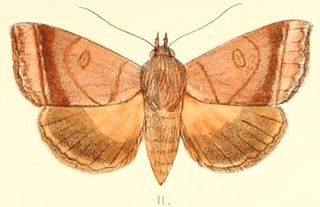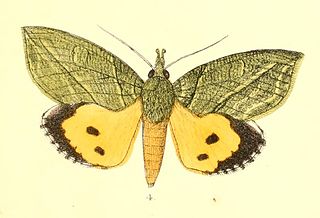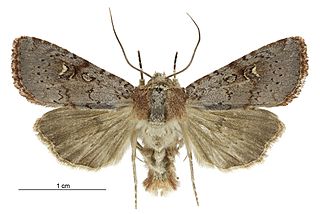
Cerapteryx graminis, the antler moth, is a moth of the family Noctuidae. It is a common species throughout most of Europe but is lacking in the very dry southern regions. The northernmost occurrence is Iceland, and above the Arctic circle. It also occurs in Siberia and in North Mongolia. The species has been introduced to North America. In the Alps it rises to an altitude of 2100 meters.

The Hebrew character is a moth in the family Noctuidae. The species was first described by Carl Linnaeus in his 1758 10th edition of Systema Naturae. It is found throughout Europe.

Daphnis nerii, the oleander hawk-moth or army green moth, is a moth of the family Sphingidae. It was described by Carl Linnaeus in his 1758 10th edition of Systema Naturae.

Corcobara is a monotypic moth genus of the family Erebidae first described by Frederic Moore in 1882. Its only species, Corcobara angulipennis, described by the same author in the same year, is found in India, Thailand, Cambodia, Myanmar, Malaysia, Indonesia, New Guinea, Sri Lanka and the Solomons.

Polynesia is a genus of moths in the family Geometridae. Species are found throughout India, Sri Lanka and Andaman Islands.

Eudocima materna, the dot-underwing moth, is a moth of the family Erebidae found in widespread parts of the world, mainly in tropical Asia extending to New Guinea and Australia as well as in Africa. Reports from the United States, Canada and the French Antilles are now considered to be Eudocima apta. The species can be differentiated from other Eudocima moths by the presence of small central black dot in each hindwing. The species was first described by Carl Linnaeus in his 1767 12th edition of Systema Naturae.

Speiredonia itynx is a species of moth of the family Erebidae first described by Johan Christian Fabricius in 1787. It is found in India, Sri Lanka, Vietnam, Java, Palawan, Sulawesi and the Moluccas.

Ophiusa trapezium is a moth of the family Erebidae first described by Achille Guenée in 1852. It is found from the Indo-Australian tropics of India, Sri Lanka to Queensland, the Bismarck Islands and New Caledonia. Adults are fruit piercers.

Eudocima hypermnestra is a moth of the family Erebidae described by Pieter Cramer in 1780. It is found in China, Thailand, Taiwan, India and Sri Lanka.

Comostola pyrrhogona is a moth of the family Geometridae described by Francis Walker in 1866. It is found in the Indo-Australian tropics from India, Sri Lanka to Taiwan, and east to Vanuatu, New Caledonia, northern Australia and Norfolk Island.

Doloessa ochrociliella is a species of snout moth in the genus Doloessa. It was described by Émile Louis Ragonot in 1893 and is known from Japan, Australia and Sri Lanka.

Gesonia obeditalis is a species of moth of the family Noctuidae first described by Francis Walker in 1859. It is found from eastern Africa, the Seychelles, the Maldives and the Oriental tropics of India, Myanmar, Sri Lanka east to the Philippines, the Sula Islands and Australia. The adult moth has brown wings with a scalloped dark brown band near the margin. The hindwings are similar in pattern to the forewings but are a paler shade of brown.

Phazaca theclata is a moth of the family Uraniidae. It was first described by Achille Guenée in 1858. It is known from Africa south of the Sahara, from Saudi Arabia, as well as from India, Japan, Myanmar, Nepal and Sri Lanka.
Ziridava xylinaria, the indistinct carpet, is a moth in the family Geometridae. The species was first described by Francis Walker in 1863. It is found in Sri Lanka, India, Hong Kong and on Peninsular Malaysia, Borneo, Java and possibly the Philippines and Sulawesi.
Eois dissimilis is a moth in the family Geometridae. It is found in the Indian Subregion and Sri Lanka.

Hypomecis separata is a species of moth of the family Geometridae. It was first described by Francis Walker in 1863. It is found in Sri Lanka, India, Java and Borneo.

Risoba repugnans is a species of moth of the family Nolidae first described by Francis Walker in 1865.

Ichneutica hartii is a moth of the family Noctuidae. This species is endemic to New Zealand and can be found only in the North Island. I. hartii is similar in appearance to Ichneutica agrorastis but can be distinguished as it tends to be smaller in size and have a more purplish shade to its fore wings. I. hartii tends to be found inhabiting lowland native forest or forests found in the hilly ranges of the North Island. It is attracted to light and the adults of this moth are on the wing between January and March. Much of its life history is currently unknown as are the larvae host species.

Meterana pansicolor is a species of moth in the family Noctuidae. It is endemic to New Zealand. This species is classified as "At Risk, Naturally Uncommon" by the Department of Conservation.

Xanthodes transversa, the transverse moth or hibiscus caterpillar, is a moth of the family Nolidae. The species was first described by Achille Guenée in 1852. It is found in India, Sri Lanka, the Andaman Islands, the Nicobar Islands, China, Hong Kong, Vanuatu, Java, New Guinea, Japan, the Ryukyu Islands, Singapore, Indonesia and Australia.


















